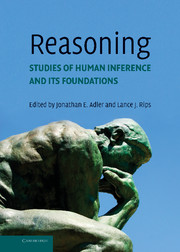5 - When Rationality Fails
Published online by Cambridge University Press: 05 June 2012
Summary
Introduction
There are two ways in which theories can fail to explain: through indeterminacy and through inadequacy. A theory is indeterminate when and to the extent that it fails to yield unique predictions. It is inadequate when its predictions fail. Of these, the second is the more serious problem. A theory may be less than fully determinate and yet have explanatory power if it excludes at least one abstractly possible event or state of affairs. To yield a determinate prediction, it must then be supplemented by other considerations. The theory is weak, but not useless. It is in more serious trouble if an event or state of affairs that actually materializes is among those excluded by the theory. In saying this, I am not espousing naïve falsificationism, but simply making the common-sense observation that it is worse for a theory to predict wrongly than to predict weakly but truthfully. In the former case it must be replaced or modified, not supplemented.
My concern here is not with scientific theories in general, but with failures of rational-choice theory. As argued below, rational-choice theory is first and foremost a normative theory and only secondarily an explanatory approach. It tells people how to act and predicts that they will act in the way it tells them to. To the extent that it fails to give unambiguous prescriptions, it is indeterminate.
Information
- Type
- Chapter
- Information
- ReasoningStudies of Human Inference and its Foundations, pp. 94 - 113Publisher: Cambridge University PressPrint publication year: 2008
References
Accessibility standard: Unknown
Why this information is here
This section outlines the accessibility features of this content - including support for screen readers, full keyboard navigation and high-contrast display options. This may not be relevant for you.Accessibility Information
- 1
- Cited by
